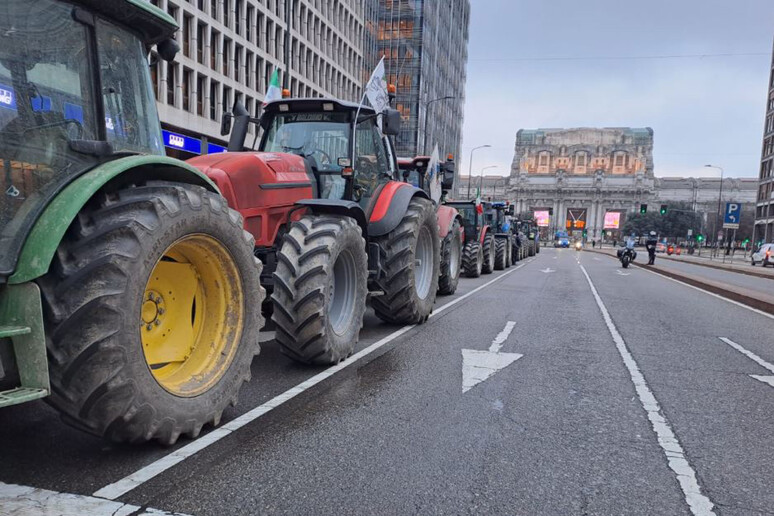The European Commission unveiled the
new blueprint for the agricultural sector that despite gobbling
up a third of the EU budget in subsidies from the Common
Agricultural Policy (CAP) has long resented Brussels' liberal
approach to trade.
Months of protests last year saw farmers so furious at
regulatory burdens, squeezed revenues and what they see as
unfair competition from less-regulated overseas rivals, that
they hurled eggs, sprayed manure and blockaded the Belgian
capital's streets.
The "Vision for Agriculture and Food", as the review is titled,
is "a strong response to this call for help", the European
Commission's Vice-President for Reforms, Raffaele Fitto, said at
a press conference, referring to the protests.
To ensure that the agricultural sector is not "put at a
competitive disadvantage", the Commission will pursue "a
stronger alignment of production standards applied to imported
products", the plan reads. In particular, Brussels will see to
it that "the most hazardous pesticides banned in the EU for
health and environmental reasons" are not allowed back in
"through imported products".
While waiting for the Commission's legal proposals to carry out
the crackdown on agricultural imports, Brussels is studying how
to better redistribute the direct subsidy payments from CAP to
towards the farmers who "need them most".
The focus is to shift towards incentives rather than conditions
in CAP payments. In addition, the money should be geared more
towards farmers who are actively involved in food production and
the preservation of the environment.
According to the Commission, the production of agricultural
goods and products, which are essential for the EU's strategic
autonomy and resilience, should be prioritised.
EU officials are also working on a second simplification package
of the current CAP to further reduce the last remaining
bureaucratic burdens on small farms after last year's
streamlining following the farmers' protests.
Flat-rate payments and the suspension of the performance review,
i.e. an annual control system introduced with the current CAP to
check whether payments are in line with national spending plans,
are some of the measures that the Commission will put in place.
Chorus of criticism and praise.
Herbert Dorfmann, a member of the European Parliament for the
centre-right European People's Party (EPP), welcomed the plans
from the European Commission.
"For us it is clear: we do not want any new burdens, but
flexibility and solid income for farmers through a strong Common
Agricultural Policy," the EPP spokesman on agriculture and rural
development said in a press release.
Italian Agricultural Minister Francesco Lollobrigida also
welcomed the roadmap as a "clear and radical" change from the
Commission in a statement.
From the enhancement of local production, to the recognition of
the central role of farmers: the issues addressed in recent
years finally find a place in the new plans of the Commission,
Lollobrigida said.
The Italian minister was also pleased with the emphasis on food
sovereignty, how a country chooses and produces its food, in the
EU plan for agriculture.
It is the first time that the EU not only "recognises the
contribution of agricultural production to the economy, but also
to the sustainability of rural areas and their connection with
the cultural and natural heritage of each place", said Greek
Agricultural Minister Konstantinos Tsiaras.
Tsiaras stressed the importance of "strengthening of policies
aimed at reducing production costs and regulation for the use of
pesticides in the production of imported products, as well as
addressing unfair practices" to protect European farmers.
The reception however was not universally positive, especially
among environmental groups.
While the pan-European farmers' group Copa-Cogeca who says it
wants to ensure EU agriculture is sustainable, innovative and
competitive, said the plans were "ambitious", environmental
groups complained it was light on green commitments, promising
instead deregulation as part of a broader drive to revamp
Europe's economic competitiveness, which critics say risks
undermining the fight against climate change.
The new plans "do little to curtail the environmental, climate
and socioeconomic threats facing most farmers", according to
Greenpeace.
The European Environment Bureau (EEB), an umbrella group of
activists, also described the final text as "timid" compared to
an earlier version that had been circulated.
Tomas Prouza from the Czech Confederation of Commerce and
Tourism said the plans did not produce the necessary reforms for
the agricultural sector. The Commission's vision for agriculture
was a missed opportunity to push through long-delayed changes
that would have strengthened the sector's resilience, Prouza
expressed in a press release.
"Instead of a truly reformist material, there is a document on
the table that may calm some striking farmers, but does nothing
to solve the problems that affect citizens," Prouza said.
The material does not address agricultural issues in their
entirety, from the processing of agricultural production to food
production, sales and consumption, Prouza added.
In his view, there is also a lack of greater emphasis on
strengthening the single European market. "All we see in the
material is a further increase in barriers," he added.
(continues)
((The content is based on news by agencies participating in the
enr, in this case AFP, AMNA, ANSA, CTK, dpa, TASR)
ALL RIGHTS RESERVED © Copyright ANSA











